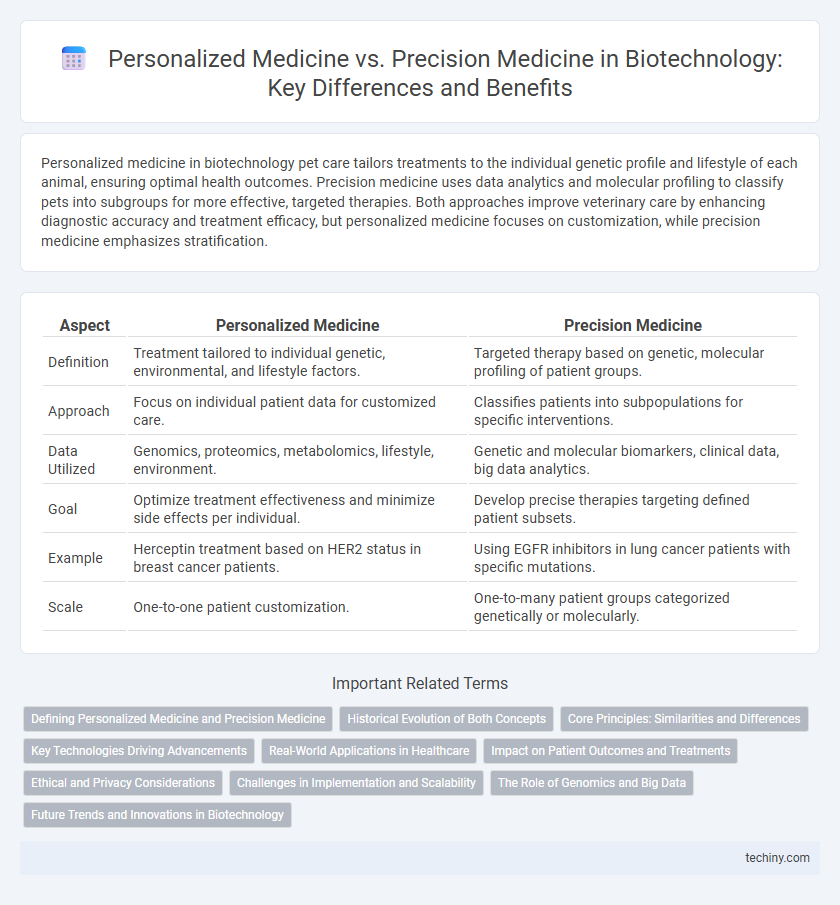Personalized medicine in biotechnology pet care tailors treatments to the individual genetic profile and lifestyle of each animal, ensuring optimal health outcomes. Precision medicine uses data analytics and molecular profiling to classify pets into subgroups for more effective, targeted therapies. Both approaches improve veterinary care by enhancing diagnostic accuracy and treatment efficacy, but personalized medicine focuses on customization, while precision medicine emphasizes stratification.
Table of Comparison
| Aspect | Personalized Medicine | Precision Medicine |
|---|---|---|
| Definition | Treatment tailored to individual genetic, environmental, and lifestyle factors. | Targeted therapy based on genetic, molecular profiling of patient groups. |
| Approach | Focus on individual patient data for customized care. | Classifies patients into subpopulations for specific interventions. |
| Data Utilized | Genomics, proteomics, metabolomics, lifestyle, environment. | Genetic and molecular biomarkers, clinical data, big data analytics. |
| Goal | Optimize treatment effectiveness and minimize side effects per individual. | Develop precise therapies targeting defined patient subsets. |
| Example | Herceptin treatment based on HER2 status in breast cancer patients. | Using EGFR inhibitors in lung cancer patients with specific mutations. |
| Scale | One-to-one patient customization. | One-to-many patient groups categorized genetically or molecularly. |
Defining Personalized Medicine and Precision Medicine
Personalized medicine tailors healthcare strategies to an individual's unique genetic, environmental, and lifestyle factors, while precision medicine categorizes patients into subpopulations based on molecular and genetic profiling for targeted therapies. Personalized medicine emphasizes customized treatment plans designed specifically for a single patient, leveraging genomic sequencing and biomarker information. Precision medicine, by contrast, uses detailed molecular classifications to optimize therapeutic interventions across defined patient groups, enhancing efficacy and reducing adverse effects.
Historical Evolution of Both Concepts
Personalized medicine traces its origins to the Human Genome Project in the early 2000s, emphasizing tailored treatments based on individual genetic profiles. Precision medicine evolved subsequently, expanding the scope to include environmental, lifestyle, and molecular data, integrating multi-omics technologies for more accurate disease targeting. Both concepts have driven advances in biotechnology, improving diagnostic tools and therapeutic strategies by leveraging genomic sequencing and bioinformatics.
Core Principles: Similarities and Differences
Personalized medicine and precision medicine both aim to tailor medical treatment to individual patient characteristics using genomic, environmental, and lifestyle data. Personalized medicine emphasizes customizing healthcare based on patient-specific preferences and genetic profiles, while precision medicine focuses on stratifying populations into subgroups for targeted therapies using molecular and genetic biomarkers. Core principles overlap in leveraging big data, advanced diagnostics, and bioinformatics to improve therapeutic efficacy and reduce adverse effects through more accurate disease classification.
Key Technologies Driving Advancements
Genomic sequencing and CRISPR gene editing are pivotal technologies propelling advancements in both personalized and precision medicine, enabling detailed molecular insights and targeted therapeutic interventions. AI-driven bioinformatics enhances data analysis, facilitating the identification of patient-specific biomarkers and optimizing treatment regimens. Liquid biopsy and single-cell analysis further refine diagnostic precision by capturing dynamic disease states and heterogeneity at the cellular level.
Real-World Applications in Healthcare
Personalized medicine tailors treatments based on individual genetic profiles, lifestyle, and environmental factors, enhancing therapy effectiveness and reducing adverse reactions. Precision medicine leverages large-scale genomic data and biomarkers to stratify patient populations for targeted interventions, improving disease management and clinical outcomes. Real-world applications include oncology, where genomic sequencing guides targeted drug therapy, and chronic disease management, where patient-specific data inform customized treatment plans.
Impact on Patient Outcomes and Treatments
Personalized medicine customizes treatments based on individual genetic, environmental, and lifestyle factors, significantly improving patient outcomes by targeting therapy more effectively. Precision medicine uses large-scale data analysis and molecular profiling to develop targeted interventions, enhancing treatment efficacy and minimizing adverse effects. Both approaches drive advancements in biotechnology, leading to more accurate diagnoses and optimized therapeutic strategies for diverse patient populations.
Ethical and Privacy Considerations
Personalized medicine and precision medicine both rely on extensive genomic and health data, raising significant ethical and privacy concerns regarding data security and patient consent. Ensuring equitable access and preventing genetic discrimination are critical challenges in implementing these approaches at scale. Robust regulatory frameworks and transparent data governance are essential to protect individual privacy while maximizing therapeutic benefits.
Challenges in Implementation and Scalability
Personalized medicine faces challenges in implementation due to the complexity of integrating diverse patient-specific genetic, environmental, and lifestyle data into clinical workflows. Precision medicine struggles with scalability as it requires robust bioinformatics infrastructure and standardized protocols to analyze vast datasets for targeted therapies across varied populations. Both approaches demand significant investment in interoperable health IT systems, regulatory frameworks, and healthcare professional training to ensure effective and widespread adoption.
The Role of Genomics and Big Data
Genomics and big data play a pivotal role in both personalized medicine and precision medicine by enabling detailed analysis of individual genetic profiles and large-scale population genomic datasets. Personalized medicine leverages genomic sequencing to tailor treatments to an individual's unique genetic makeup, improving efficacy and reducing adverse effects. Precision medicine uses big data analytics to identify patterns and optimize therapy strategies across patient subgroups, enhancing targeted interventions based on genetic, environmental, and lifestyle factors.
Future Trends and Innovations in Biotechnology
Personalized medicine leverages individual genetic profiles to tailor treatments, while precision medicine integrates comprehensive data including genetics, environment, and lifestyle for broader population stratification. Future trends emphasize advances in genomic editing technologies like CRISPR, multi-omics data integration, and AI-driven predictive analytics to enhance therapeutic efficacy. Innovations in biomarker discovery and real-time health monitoring devices are driving the dynamic evolution of tailored healthcare solutions within biotechnology.
personalized medicine vs precision medicine Infographic

 techiny.com
techiny.com